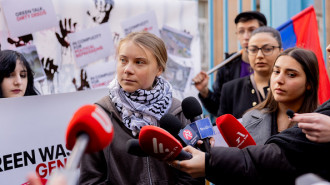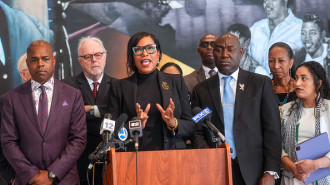Gulf States, Canada vow to boost cooperation against terrorism
Foreign ministers from the six-nation Arab Gulf Cooperation Council backed their Canadian counterpart, Stephane Dion on the need to "dry up" sources of militant financing.
They also noted that the international fight against IS and other terrorist organisations "is not religious or linked to a religion or sect, but rather a war on terror."
The group pledged to "strengthen joint cooperation... to eradicate terrorism", vowing to double "efforts to stop the flow of foreign terrorist fighters" to Syria and Iraq where the Islamic State group has seized swathes of territory since 2014.
However, some analysts have criticised the GCC-Canadian pledge of cooperation due to rampant human rights abuses in Gulf states.
Hasan Hafidh, a researcher on Gulf States at Leeds University told The New Arab that despite Saudi Arabia's "abysmal human rights record" Canada's prime minister has defended green-lighting a $15 billion arms deal with the kingdom as a "matter of principle".
On Monday, rights group Amnesty International urged the Saudi-led coalition fighting Houthi rebels in Yemen to halt their use of internationally banned ammunition against civilians in the country.
Unexploded cluster bombs dropped by the Arab coalition on rebel-held northern Yemen have turned areas into "minefields" for civilians, it said.
 |
Countries with influence should urge the Saudi Arabia-led coalition forces to stop using cluster munitions, which are internationally banned and inherently indiscriminate. - Amnesty International |
 |
Amnesty said children were among civilians "killed and maimed" by such submunition, urging international assistance to clear contaminated areas and the coalition to stop using such bombs.
"Countries with influence should urge the Saudi Arabia-led coalition forces to stop using cluster munitions, which are internationally banned and inherently indiscriminate," it said in a statement.
Gulf Arab states have been persistently accused of human rights abuses for several decades.
However, recent developments in the region have seen fingers point towards the Gulf States, especially Saudi Arabia, for their alleged financing of militants as well as efforts to spread extremist interpretation of Islam across the globe.
"If Western governments weren't disingenuous about tackling extremism, they certainly wouldn't be dealing with Saudi Arabia to try counter it - that's just nonsensical," Hafidh said.
Meanwhile, Canada has recently increased its involvement in the global fight against terrorism.
On Saturday, Dion announced the launch of a deal with Tunisia to support the North African country's efforts to handle its home-grown fundamentalism issue.
Saudi Arabia was joined by Bahrain, Kuwait, Oman, Qatar and the United Arab Emirates in the meeting with the Canadian foreign minister.







 Follow the Middle East's top stories in English at The New Arab on Google News
Follow the Middle East's top stories in English at The New Arab on Google News


